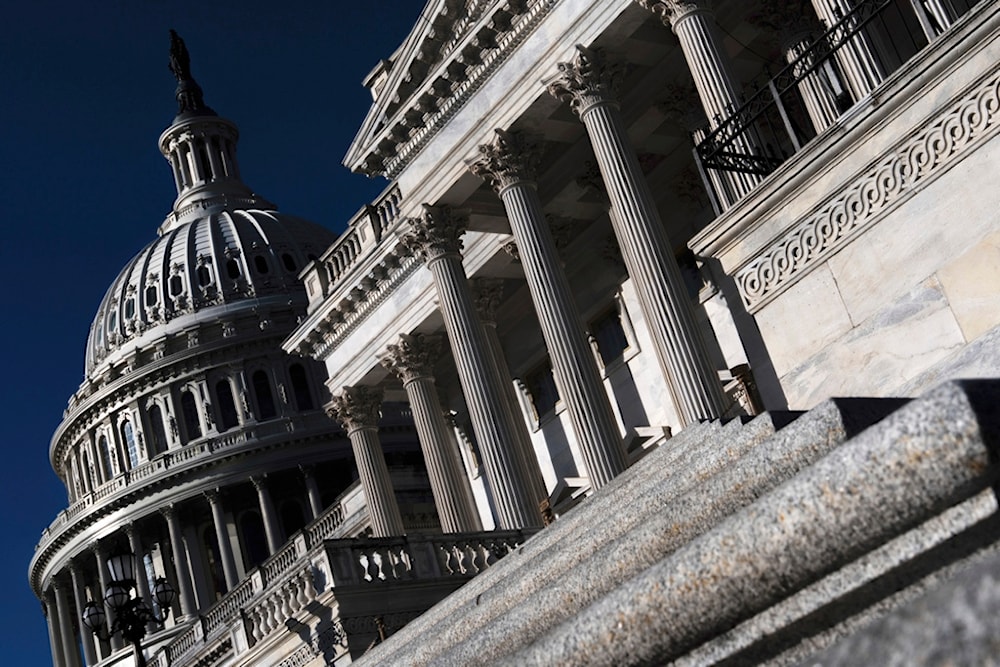Democrat lawmakers mulling disrupting Trump speech before Congress
Democratic members of Congress want to protest Trump's speech before them but are disagreeing on the best manner to do so.
-

The Capitol is pictured, Monday, March 3, 2025, in Washington (AP)
Democratic lawmakers are considering various protest strategies ahead of President Donald Trump's speech to Congress on Tuesday, with some exploring the possibility of outright disruptions.
The discussions reflect an ongoing divide within the party between traditionalists and a more confrontational anti-Trump faction. While Democratic leaders have encouraged members to bring guests affected by Trump's policies as a form of protest, some lawmakers believe stronger actions are necessary to express their discontent.
A House Democrat speaking to Axios emphasized that while there is consensus that the occasion should not be treated as routine, though disagreement remains on the most effective form of demonstration. Some Democrats are considering walking out of the chamber in response to specific statements by Trump.
Others have suggested bringing symbolic items such as signs expressing opposition to the administration, egg cartons to highlight inflation, or pocket-sized copies of the Constitution to underline concerns about Trump’s alleged violations of congressional authority.
Discussions on the use of hand clappers, red cards, and other props have also taken place, though party leadership has reportedly discouraged such tactics in closed-door meetings.
The debate over these protest methods reflects broader divisions among Democratic lawmakers, with some hearing from constituents who support direct confrontation and others cautioning that dramatic disruptions could play into Trump's hands.
Frequent disruptions of Congress addresses
The increased frequency of disruptions during joint session speeches in recent years has further complicated the discussion. The 2009 outburst by Rep. Joe Wilson against then-President Barack Obama, the heckling of then-President Joe Biden during his State of the Union addresses, and the interruption of Israeli Prime Minister Benjamin Netanyahu’s speech by Rep. Rashida Tlaib last year have all set precedents for vocal opposition in the chamber.
While some Democrats advocate for direct actions, others are opting for more subtle forms of protest. The Democratic Women’s Caucus is organizing a collective display by encouraging members to wear pink, while female members of the Congressional Black Caucus have discussed wearing black to symbolize a somber mood.
Meanwhile, Ukraine Caucus co-chair Marcy Kaptur plans to distribute blue and yellow ties and scarves in solidarity with Ukrainian President Volodymyr Zelensky. Additionally, some lawmakers intend to sit in silence and withhold applause for the duration of Trump’s speech, using passive resistance to register their discontent.
House Minority Leader Hakeem Jeffries, in a letter to Democratic lawmakers, urged a strong and dignified presence in the chamber. He acknowledged that some members may choose to skip the event but stressed the importance of demonstrating unity.
House Democratic Caucus Chair Pete Aguilar echoed this sentiment, emphasizing that the focus should remain on advocating for the health, safety, and economic well-being of constituents rather than resorting to theatrics.
Democrats critically set back
The Democratic Party is facing a stark reality as voter dissatisfaction reaches its highest level since 2008, Newsweek reported on Wednesday, citing a new Quinnipiac poll.
Republican Donald Trump secured a decisive victory over former Democratic Vice President Kamala Harris in the 2024 presidential election. His momentum has continued to grow this month, with his favorability ratings rising ahead of his inauguration.
Enthusiasm for the Democratic Party has steadily declined since the November election, as indicated by a YouGov tracker. As of January 27, 2025, the party’s unfavorability rating has hit its highest recorded level.
According to the Quinnipiac, only 31% of voters view the Democratic Party favorably, while 57% hold an unfavorable opinion.
"This is the highest percentage of voters having an unfavorable opinion of the Democratic Party since the Quinnipiac University Poll began asking this question," the poll highlighted.
The findings reveal that among independent voters, just 22% have a favorable opinion of the Democratic Party, compared to 59% with an unfavorable view. Among men, only 22% hold a favorable view, while 67% have an unfavorable opinion. Meanwhile, 39% of women view the party favorably, compared to 47% who hold an unfavorable opinion.

 4 Min Read
4 Min Read








